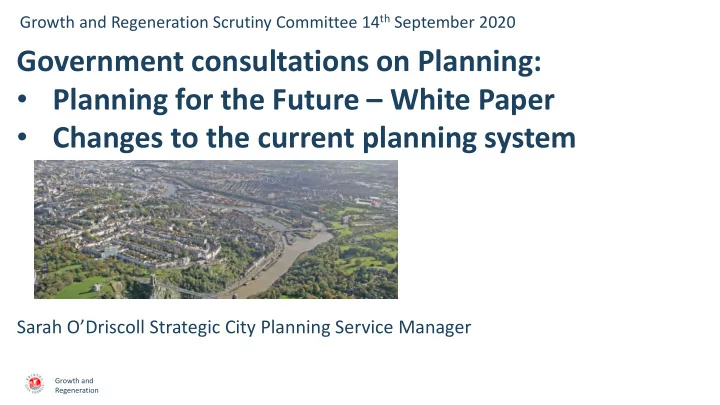

Growth and Regeneration Scrutiny Committee 14 th September 2020 Government consultations on Planning: • Planning for the Future – White Paper • Changes to the current planning system Sarah O’Driscoll Strategic City Planning Service Manager Growth and Regeneration
Two government consultations on planning were published on 6 th August 2020 • Planning for the Future • Changes to the current - White Paper deadline planning system for comments 29.10.20 deadline for comments 1.10.20
1. Overview Planning for the Future White Paper • 6 th August – 29 th October
- Local Plans and national policy • Local plans simplified and standardised to focus on identifying three categories of land – growth, renewal and protected areas. In growth areas, outline approval automatic for forms and types of development specified in the plan; • Statutory timetable of no more than 30 months for plan preparation – government expecting new plans to be in place by end of current parliament (May 2024); • No general policies for development in local plans - the National Planning Policy Framework (NPPF) would become the primary source of development management policies; • The duty to co-operate would be removed – ‘further consideration’ being given to the way in which strategic cross-boundary issues can be adequately planned for (references to Metro Mayor roles but no direct references to Spatial Development Strategies); • The existing policy for protecting Green Belt would be remain.
- Planning applications and decisions Applications to be shorter and more standardised; • • Fees set nationally but cover at least the full cost of processing applications; • Deciding planning applications to be faster and more certain, with firm deadlines; • Public consultation on planning applications to be streamlined - emphasis instead on engagement at the plan-making stage (where there would be one stage of formal consultation); • ‘Fast-track for beauty’ - high-quality development proposals would get automatic permission; • Locally prepared design codes will be more binding on planning decisions; • Each local planning authority to have a chief officer for design and place- making ;
- Development contributions and delivery • CIL to be replaced by new infrastructure levy, a nationally-set, flat rate charge; • Large building sites would be split between developers to accelerate delivery; • Housing delivery test and the presumption in favour of sustainable development maintained; • The costs of operating the planning system principally funded by developer contribution ; • Regulatory review to identify and eliminate outdated regulations;
2. Overview Changes to the current planning system - Consultation on changes to planning policy and regulations • 6 th August to 1 st October
Revised standard method The ‘standard method’ calculates housing numbers needed in each area. • Former JSP’s agreed Current standard REVISED distribution method STANDARD (10 year equivalent) (10 years) METHOD (10 years) BRISTOL 16,750 23,680 24,900
First Homes • The Government intends to set out in policy that a minimum of 25 per cent of all affordable housing units secured through developer contributions should be First Homes. Small sites threshold • Proposal to raise the small sites threshold so that schemes of up to 40 or 50 homes do not provide affordable housing . This is intended to help smaller house builders. Permission in principle • The current Permission in Principle system will be extended to major development.
Contact: Zoe Willcox Director, Development of Place zoe.willcox@bristol.gov.uk Sarah O’Driscoll, Strategic City Planning Service Manager sarah.odriscoll@bristol.gov.uk Growth and Regeneration
Recommend
More recommend